触发器简介:
触发器是一种特殊的存储过程,它的执行不是由程序调用,也不是手动执行,而是由事件来触发。触发器是当对某一个表进行操作。例如:update、insert、delete这些操作的时候,系统会自动调用执行该表上对应的触发器。
触发器分类:
1、DML( 数据操纵语言 Data Manipulation Language)触发器:是指触发器在数据库中发生 DML 事件时将启用。DML事件是指在表或视图中对数据进行的 insert、update、delete 操作的语句。
2、DDL(数据定义语言 Data Definition Language)触发器:是指当服务器或数据库中发生 DDL 事件时将启用。DDL事件是指在表或索引中的 create、alter、drop 操作语句。
3、登陆触发器:是指当用户登录 SQL SERVER 实例建立会话时触发。如果身份验证失败,登录触发器不会触发。
其中 DML 触发器比较常用,根据 DML 触发器触发的方式不同又分为以下两种情况:
after 触发器(之后触发):其中 after 触发器要求只有执行 insert、update、delete 某一操作之后触发器才会被触发,且只能定义在表上。
instead of 触发器 (之前触发):instead of 触发器并不执行其定义的操作(insert、update、delete)而仅是执行触发器本身。可以在表或视图上定义 instead of 触发器。
DML 触发器有两个特殊的表:插入表(instered)和删除表(deleted),这两张表是逻辑表。这两个表是建立在数据库服务器的内存中,而且两张表的都是只读的。这两张表的结构和触发器所在的数据表的结构是一样的。当触发器完成工作后,这两张表就会被删除。Inserted 表的数据是插入或是修改后的数据,而 deleted 表的数据是更新前的或是已删除的数据。

AFTER 触发器语法:
1 CREATE [ OR ALTER ] TRIGGER [ schema_name . ]trigger_name 2 ON { table } 3 [ WITH <dml_trigger_option> [ ,...n ] ] 4 { FOR | AFTER } 5 { [ INSERT ] [ , ] [ UPDATE ] [ , ] [ DELETE ] } 6 AS { sql_statement [ ; ] [ ,...n ] } 7 8 <dml_trigger_option> ::= 9 [ NATIVE_COMPILATION ] 10 [ SCHEMABINDING ] 11 [ EXECUTE AS Clause ]
INSTEAD OF 触发器语法:
1 CREATE [ OR ALTER ] TRIGGER [ schema_name . ]trigger_name 2 ON { table | view } 3 [ WITH <dml_trigger_option> [ ,...n ] ] 4 { FOR | AFTER | INSTEAD OF } 5 { [ INSERT ] [ , ] [ UPDATE ] [ , ] [ DELETE ] } 6 [ WITH APPEND ] 7 [ NOT FOR REPLICATION ] 8 AS { sql_statement [ ; ] [ ,...n ] | EXTERNAL NAME <method specifier [ ; ] > } 9 10 <dml_trigger_option> ::= 11 [ ENCRYPTION ] 12 [ EXECUTE AS Clause ] 13 14 <method_specifier> ::= 15 assembly_name.class_name.method_name
DDL 触发器语法:
1 CREATE [ OR ALTER ] TRIGGER trigger_name 2 ON { ALL SERVER | DATABASE } 3 [ WITH <ddl_trigger_option> [ ,...n ] ] 4 { FOR | AFTER } { event_type | event_group } [ ,...n ] 5 AS { sql_statement [ ; ] [ ,...n ] | EXTERNAL NAME < method specifier > [ ; ] } 6 7 <ddl_trigger_option> ::= 8 [ ENCRYPTION ] 9 [ EXECUTE AS Clause ]
登陆触发器语法:
1 CREATE [ OR ALTER ] TRIGGER trigger_name 2 ON ALL SERVER 3 [ WITH <logon_trigger_option> [ ,...n ] ] 4 { FOR| AFTER } LOGON 5 AS { sql_statement [ ; ] [ ,...n ] | EXTERNAL NAME < method specifier > [ ; ] } 6 7 <logon_trigger_option> ::= 8 [ ENCRYPTION ] 9 [ EXECUTE AS Clause ]
参数:
CREATE OR ALTER:
创建或者有条件的修改触发器(即要修改的触发器必须已经存在)。
schema_name:
DML触发器所属的模式的名称(即所有者,例如:dbo)。
trigger_name:
是触发器的名称。
table | view:
是执行 DML 触发器的表或视图,有时称为触发器表或触发器视图。指定表格或视图的完全限定名称是可选的。视图只能由 INSTEAD OF 触发器引用。
DATABASE:
将 DDL 触发器的范围应用于当前数据库。如果指定,触发器会在当前数据库中发生 event_type 或 event_group 时触发。
ALL SERVER:
将 DDL 或登录触发器的作用域应用于当前服务器。如果指定,触发器会在当前服务器的任何地方发生 event_type 或 event_group 时触发。
WITH ENCRYPTION:
加密 CREATE TRIGGER 语句的文本。使用 WITH ENCRYPTION 可以防止触发器作为 SQL Server 复制的一部分进行发布。无法为 CLR 触发器指定 WITH ENCRYPTION。
EXECUTE AS:
指定执行触发器的安全上下文。以便能够控制 SQL Server 实例用于验证触发器引用的任何数据库对象的权限的用户帐户。
NATIVE_COMPILATION:
表示触发器是本地编译的。
SCHEMABINDING:
指定触发器引用的表不能被删除或更改。
FOR | AFTER:
AFTER 指定仅在触发 SQL 语句中指定的所有操作成功执行时触发 DML 触发器。所有引用级联操作和约束检查在此触发器触发之前也必须成功。当 FOR 是指定的唯一关键字时,AFTER 是默认值。视图无法定义AFTER触发器。
INSTEAD OF:
指定执行 DML 触发器而不是触发 SQL 语句,因此覆盖触发语句的操作。无法为 DDL 或登录触发器指定 INSTEAD OF。
对于 INSTEAD OF 触发器,在具有指定级联动作 ON DELETE 的引用关系的表上不允许使用 DELETE 选项。类似地,在具有指定级联动作 ON UPDATE 的引用关系的表上,不允许 UPDATE 选项。
{[DELETE] [,] [INSERT] [,] [UPDATE]} :
指定在针对此表或视图进行尝试时激活 DML 触发器的数据修改语句。必须至少指定一个选项。在触发器定义中允许以任何顺序对这些选项进行任意组合。
event_type:
是执行后导致 DDL 触发器触发的 Transact-SQL 语言事件的名称。
event_group:
是 Transact-SQL 语言事件的预定义分组的名称。属于任何 Transact-SQL 语言事件执行后的 DDL 触发器触发 event_group。
sql_statement:
是触发条件和动作。触发条件指定附加条件,以确定尝试的 DML,DDL 或登录事件是否导致执行触发器操作。
<method_specifier>:
对于 CLR 触发器,指定要与触发器绑定的程序集的方法。该方法不得不引用任何参数并返回 void。class_name 必须是有效的 SQL Server 标识符,并且必须作为具有程序集可见性的程序集中的类存在。
以下是DML触发器的使用,先看看示例数据:
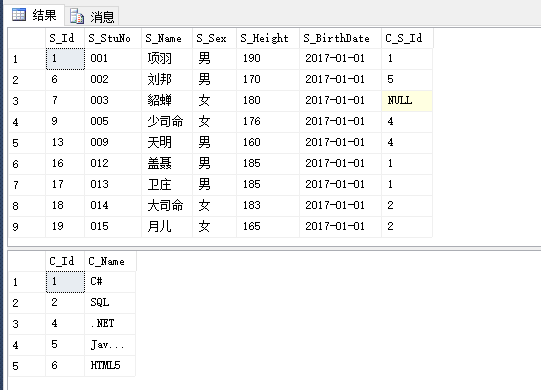
insert 触发器:
1 if(OBJECT_ID('trigger_Stu_Insert') is not null) -- 判断名为 trigger_Stu_Insert 的触发器是否存在 2 drop trigger trigger_Stu_Insert -- 删除触发器 3 go 4 create trigger trigger_Stu_Insert 5 on Student -- 指定创建触发器的表 6 for insert -- insert 触发器,也可以写为 after insert 7 as 8 9 declare @C_Id int 10 declare @S_Id int 11 12 select @C_Id=C_Id from Course where C_Name='SQL' -- 获取课程为 SQL 的ID 13 select @S_Id=S_Id from inserted --插入一条学生的数据,那么这条数据就存在 inserted 这个表中 14 15 select @C_Id 16 select @S_Id 17 18 select * from inserted 19 20 update Student set C_S_Id=@C_Id where S_Id=@S_Id 21 go 22 23 insert into Student(S_StuNo,S_Name,S_Sex,S_Height,S_BirthDate) 24 values('016','大熊','男','210','2017-01-01') 25 26 select * from Student 27 select * from Course
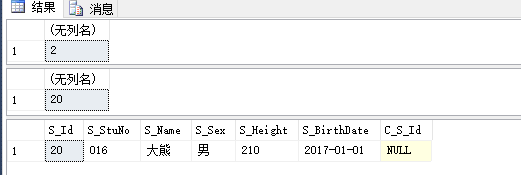
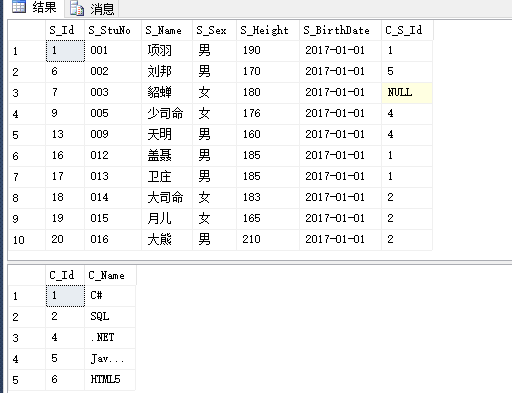
这个例子是:当 Student 表新增一条数据时,修改这条数据的课程ID。
delete 触发器:
1 if(OBJECT_ID('trigger_Stu_Delete') is not null) -- 判断名为 trigger_Stu_Delete 的触发器是否存在 2 drop trigger trigger_Stu_Delete -- 删除触发器 3 go 4 create trigger trigger_Stu_Delete 5 on Student -- 指定创建触发器的表 6 for delete -- delete 触发器,也可以写为 after delete 7 as 8 9 declare @C_S_Id int 10 11 select @C_S_Id=C_S_Id from deleted --删除的学生的数据就存在 deleted 这个表中 12 13 select @C_S_Id 14 15 select * from deleted 16 17 delete from Course where C_Id=@C_S_Id -- 删除具有删除的学生的课程ID的课程 18 go 19 20 delete from Student where C_S_Id='1' 21 22 select * from Student 23 select * from Course

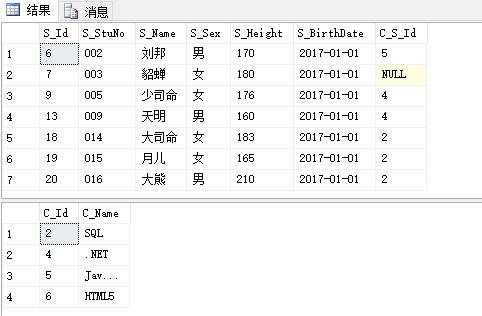
这个例子是:删除指定课程ID的学生时,并删除指定课程ID的课程。
update 触发器:
1 if(OBJECT_ID('trigger_Cou_Update') is not null) -- 判断名为 trigger_Cou_Update 的触发器是否存在 2 drop trigger trigger_Cou_Update -- 删除触发器 3 go 4 create trigger trigger_Cou_Update 5 on Course -- 指定创建触发器的表 6 for update -- update 触发器,也可以写为 after update 7 as 8 9 declare @C_Id int 10 11 select @C_Id=C_Id from deleted 12 13 select * from deleted -- 修改前的数据就存在 deleted 这个表中 14 15 select * from inserted -- 修改后的数据就存在 inserted 这个表中 16 17 update Student set C_S_Id=@C_Id where C_S_Id is null 18 go 19 20 update Course set C_Name='C#' where C_Id='4' 21 22 select * from Student 23 select * from Course
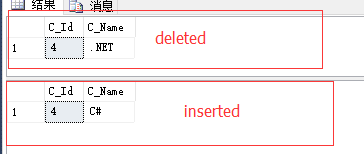
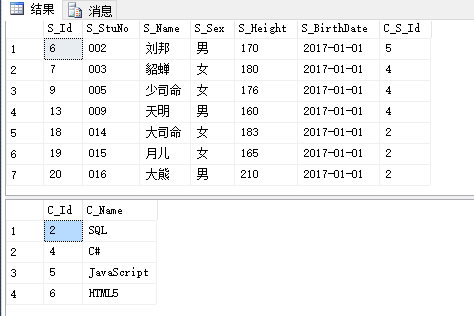
这个例子是:修改课程名称时,把课程ID为空(null)的学生的课程ID默认为修改的课程ID。
禁止修改学生学号触发器,触发器进行数据回滚:
1 if(OBJECT_ID('trigger_Stu_Update') is not null) -- 判断名为 trigger_Stu_Update 的触发器是否存在 2 drop trigger trigger_Stu_Update -- 删除触发器 3 go 4 create trigger trigger_Stu_Update 5 on Student -- 指定创建触发器的表 6 for update -- update 触发器,也可以写为 after update 7 as 8 begin try 9 if(UPDATE(S_StuNo)) -- 列级触发器:判断是否更新了学生学号(学号不允许更改) 10 begin 11 raiserror(66666,16,1) 12 end 13 end try 14 begin catch 15 select * from deleted -- 修改前的数据就存在 deleted 这个表中 16 select * from inserted -- 修改后的数据就存在 inserted 这个表中 17 rollback tran; 18 end catch 19 go 20 21 update Student set S_StuNo='006' where S_Id='20' 22 23 select * from Student
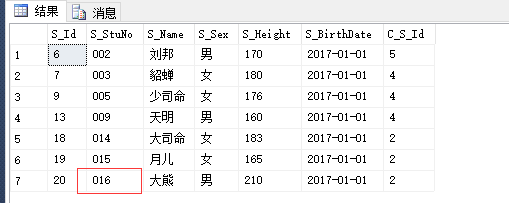
after 触发器可以指定多个操作都可以触发该触发器。只需要在 for/after 后面添加逗号和触发器的类型,例如:
1 for update,insert,delete 2 3 after update,insert,delete
instead of 触发器:
这个触发器就好玩了,下面先看看数据。
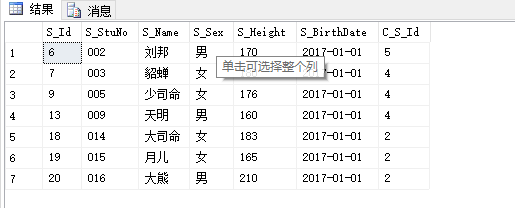
1 if(OBJECT_ID('trigger_Stu_InsteadOf') is not null) -- 判断名为 trigger_Stu_InsteadOf 的触发器是否存在 2 drop trigger trigger_Stu_InsteadOf -- 删除触发器 3 go 4 create trigger trigger_Stu_InsteadOf 5 on Student -- 指定创建触发器的表 6 instead of update,insert,delete -- instead of 触发器 7 as 8 select * from deleted -- 修改前的数据就存在 deleted 这个表中 9 select * from inserted -- 修改后的数据就存在 inserted 这个表中 10 go 11 12 update Student set S_StuNo='006' where S_Id='20' 13 14 insert into Student([S_StuNo],[S_Name],[S_Sex],[S_Height],[S_BirthDate]) 15 values('017','清红','女','180','2017-01-01') 16 17 delete from Student where C_S_Id='5' 18 19 select * from Student
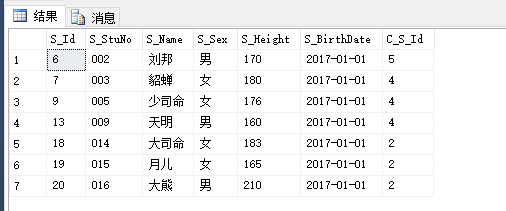
执行上面的语句之后,咦,数据怎么一点变化都没有?看看上面的介绍。instead of 触发器是之前触发。
instead of 触发器并不执行其定义的操作(insert、update、delete)而仅是执行触发器本身,并且会覆盖触发语句的操作,即 after 触发器 T-SQL 语句的操作,很明显我们上面定义的表 Student 的 after 触发器也没有效果了,现在理解了这句话了吧。
修改触发器:
1 alter trigger trigger_Stu_InsteadOf -- 修改触发器 2 on Student -- 指定创建触发器的表 3 instead of update,insert,delete -- instead of 触发器 4 as 5 declare @Count1 int 6 declare @Count2 int 7 8 select @Count1=COUNT(1) from deleted 9 select @Count2=COUNT(1) from inserted 10 11 if(@Count1>0 and @Count2>0) 12 begin 13 select 'update操作' 14 end 15 else if(@Count1>0) 16 begin 17 select 'delete操作' 18 end 19 else if(@Count2>0) 20 begin 21 select 'insert操作' 22 end 23 go 24 25 update Student set S_StuNo='006' where S_Id='20' 26 27 insert into Student([S_StuNo],[S_Name],[S_Sex],[S_Height],[S_BirthDate]) 28 values('017','清红','女','180','2017-01-01') 29 30 delete from Student where C_S_Id='5' 31 32 select * from Student
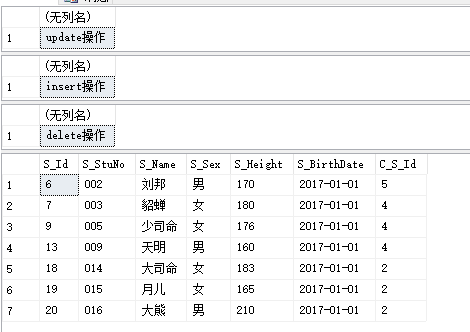
启用/禁用触发器:
1 --禁用触发器 2 disable trigger trigger_Stu_InsteadOf on Student; -- trigger_Stu_InsteadOf 触发器名称 3 --启用触发器 4 enable trigger trigger_Stu_InsteadOf on Student; -- trigger_Stu_InsteadOf 触发器名称
查询已存在的触发器:
1 -- 查询已存在的触发器 2 select * from sys.triggers; 3 select * from sys.objects where type = 'TR'; 4 select * from sysobjects where xtype='TR'
1 -- sys.trigger_events 触发器事件对象视图 2 select * from sys.trigger_events 3 4 -- 查看触发器触发事件对象 5 select a.type_desc,b.* from sys.trigger_events a 6 inner join sys.triggers b on a.object_id = b.object_id 7 where b.name = 'trigger_Stu_Insert'; 8 9 -- 查询创建触发器的 T-SQL 文本 10 exec sp_helptext 'trigger_Stu_Insert'
参考:
http://www.cnblogs.com/hoojo/archive/2011/07/20/2111316.html
https://docs.microsoft.com/en-us/sql/t-sql/statements/create-trigger-transact-sql#remarks-dml-triggers
转载于:https://www.cnblogs.com/Brambling/p/6741666.html
最后
以上就是甜甜招牌最近收集整理的关于SQL Server 创建触发器(trigger)的全部内容,更多相关SQL内容请搜索靠谱客的其他文章。








发表评论 取消回复